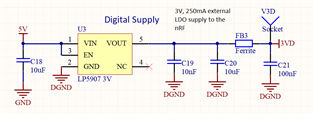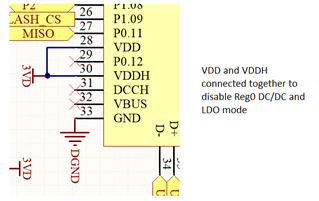Hi there, I am using the MDBT50Q-1MV2 Raytac module, with the nRF52840, and i have noticed that I have a very noisy VDD supply pin. Which definitely a problem because measures very small voltages and is very sensitive to noise.
I have an external 3V LDO:

and I have tied VDD and VDDH together to disable Reg0:
Also, I have noticed that by, adding:
causes VDD to change the noise to a 5mV 'chopping' triangle wave noise, but then depending on device operation jumps up to 15mV noise.
So my question is:
What connection + firmware arrangement for my nRF will provide the most stable VDD supply voltage (<1mV noise)?
Power consumption is not an issue.

